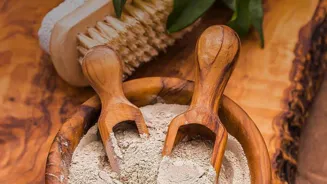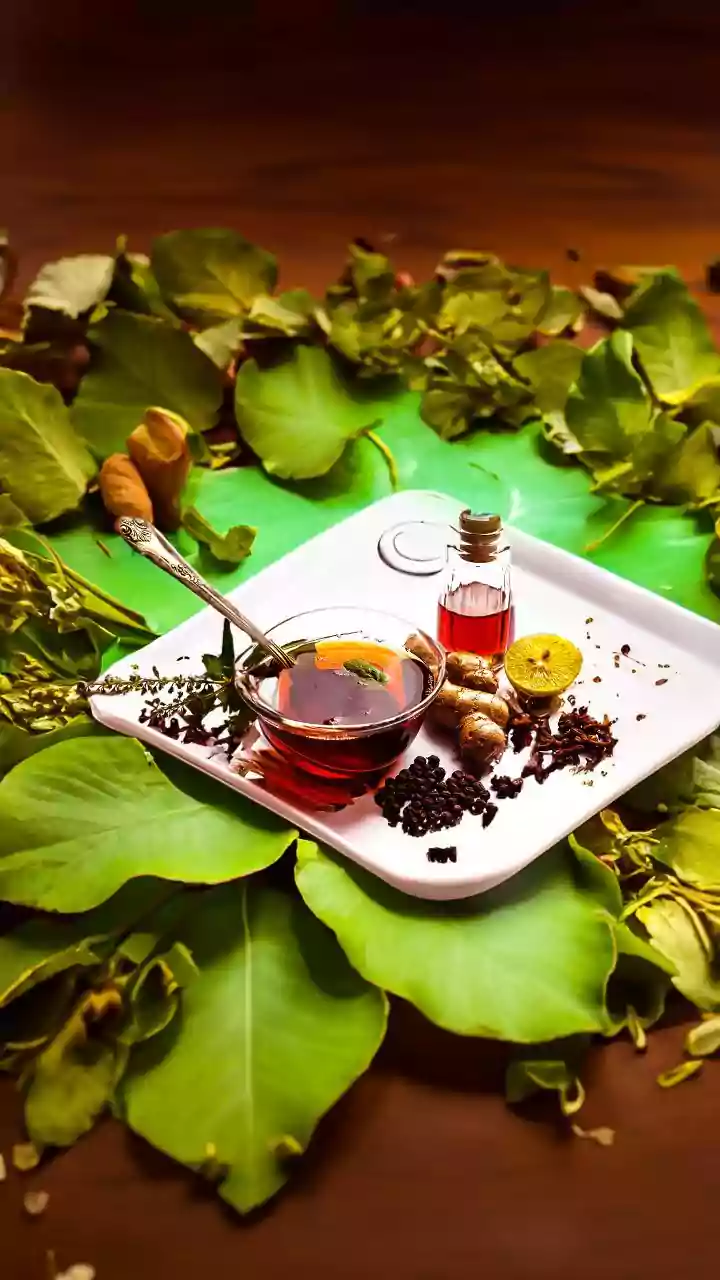Unveiling Ancient Skincare Wisdom: Clay, Herbs, Oil, Fermentation, & Sun Protection! Learn timeless secrets for radiant skin
Namaste, folks! In today's fast-paced world of serums and elaborate skincare
routines, it's easy to forget that humans have been taking care of their skin for millennia. Before fancy packaging and scientific jargon, our ancestors relied on the bounty of nature and passed down time-tested traditions.
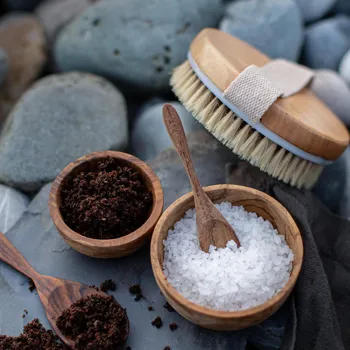
Let's take a journey back in time and explore five ancient skincare practices that are still relevant and effective today. You might be surprised to find that your grandmother's wisdom holds the key to radiant skin!
Clay masks: ancient skincare secret for clear, radiant skin
First up is the age-old practice of using clay. From the banks of the Indus Valley Civilization to the spas of ancient Rome, clay has been a staple in skincare rituals. Imagine the women of Mohenjo-daro, carefully mixing clay with water and herbs to create masks.

These weren't just random concoctions; they understood the power of clay to draw out impurities, absorb excess oil, and gently exfoliate the skin. Different types of clay, like Multani Mitti (Fuller's Earth) and bentonite clay, offer unique benefits.
Multani Mitti, beloved in Indian households, is excellent for controlling oil and reducing blemishes. Bentonite clay, known for its strong absorptive properties, is often used in detoxifying masks.
The science behind this is simple: clay particles have a negative charge, which attracts positively charged toxins and impurities from the skin. So, the next time you're reaching for an expensive exfoliating scrub, consider the humble clay mask.
It's a time-tested remedy that delivers results without breaking the bank. The beauty of clay masks also lies in their versatility. You can customize them by adding ingredients like rose water for hydration, neem for its antibacterial properties, or turmeric for a radiant glow.
This DIY approach allows you to tailor the mask to your specific skin needs, making it a truly personalized skincare experience. This ancient remedy has been passed from generation to generation.
Ancient skincare wisdom: Herbal infusions for radiant skin
Our second stop takes us to the world of herbal infusions. Think beyond your morning chai! For centuries, various cultures have harnessed the power of herbs to create tonics, washes, and compresses for the skin.
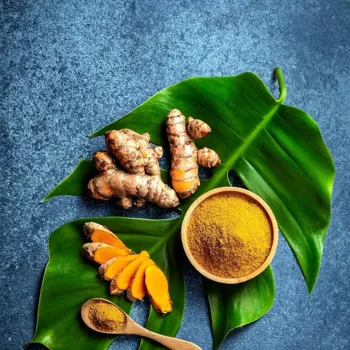
In ancient Egypt, Cleopatra was famous for bathing in milk and honey, but she also understood the benefits of herbal infusions. Egyptians used ingredients like aloe vera, chamomile, and lavender to soothe, heal, and protect their skin from the harsh desert climate.
In Ayurveda, the ancient Indian system of medicine, herbs like neem, turmeric, and tulsi (holy basil) are revered for their medicinal and skincare properties. Neem, with its antibacterial and anti-inflammatory properties, is a potent remedy for acne and skin infections.
Turmeric, rich in antioxidants, helps to brighten the skin and reduce inflammation. Tulsi, known for its purifying and detoxifying properties, is used to cleanse the skin and promote a healthy glow.
The key to using herbal infusions effectively is to choose herbs that are suitable for your skin type. For example, chamomile and calendula are excellent for sensitive skin, while tea tree and rosemary are beneficial for oily skin.
You can create your own herbal infusions by steeping dried herbs in hot water, allowing them to cool, and then using the liquid as a toner or facial rinse. You can also add these infusions to your bathwater for a soothing and therapeutic experience.
Remember to do a patch test before applying any new herbal infusion to your entire face, just to ensure that you don't have any allergic reactions. This age-old practice continues to delight.
Exploring the benefits of oil cleansing for all skin types
Next, we journey to the realm of oil cleansing. The concept of using oil to cleanse the skin might seem counterintuitive, especially if you have oily skin. However, this ancient practice, originating in both Ayurvedic and East Asian traditions, is based on the principle that "like dissolves like.

" In other words, oil can effectively dissolve and remove excess sebum, dirt, and makeup from the skin without stripping it of its natural moisture. In Ayurveda, sesame oil is a popular choice for oil cleansing, while in East Asia, camellia oil and rice bran oil are commonly used.
These oils are rich in antioxidants, essential fatty acids, and vitamins that nourish and protect the skin. The process of oil cleansing involves massaging oil onto dry skin, allowing it to penetrate the pores and dissolve impurities.
Then, a warm, damp cloth is used to gently wipe away the oil, leaving the skin clean, soft, and hydrated. The beauty of oil cleansing is that it is suitable for all skin types, even oily skin. The key is to choose an oil or blend of oils that is appropriate for your skin type.
For example, jojoba oil is similar in composition to human sebum and is excellent for balancing oily skin. Castor oil has strong cleansing properties and is often used in conjunction with other oils.
Coconut oil, while hydrating, can be comedogenic for some people, so it is best to test it on a small area of skin before using it on the entire face. Oil cleansing is so popular even now.
Fermentation in skincare: ancient secret for healthy, radiant skin
Our fourth ancient skincare secret lies in the power of fermentation. Fermented foods like yogurt, kimchi, and sauerkraut are known for their gut-friendly probiotics, but did you know that fermentation can also benefit your skin?
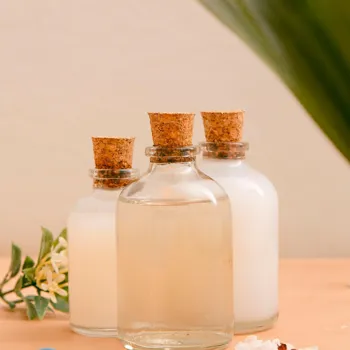
For centuries, cultures around the world have used fermented ingredients in their skincare routines. In Korean beauty, fermented rice water (makgeolli) is a popular ingredient known for its brightening and hydrating properties.
In Ayurveda, fermented milk products like buttermilk (chaas) are used to soothe and exfoliate the skin. The process of fermentation breaks down complex molecules into simpler ones, making them easier for the skin to absorb.
Fermentation also creates beneficial enzymes, amino acids, and antioxidants that can nourish, hydrate, and protect the skin. Applying fermented ingredients to the skin can help to improve skin texture, reduce inflammation, brighten the complexion, and even boost collagen production.
You can incorporate fermented ingredients into your skincare routine in a variety of ways.
You can use fermented rice water as a toner, apply a yogurt mask to exfoliate and hydrate the skin, or look for skincare products that contain fermented ingredients like galactomyces ferment filtrate or bifida ferment lysate.
Remember to introduce fermented ingredients into your routine gradually, as some people may experience sensitivity. Fermentation is not just reserved for preparing food.
Ancient civilizations used natural ingredients for sun protection
Let's not forget the importance of sun protection, a practice understood by ancient civilizations, though not always in the way we understand it today. While they didn't have SPF creams, cultures from around the world used natural ingredients to shield their skin from the sun's harmful rays.
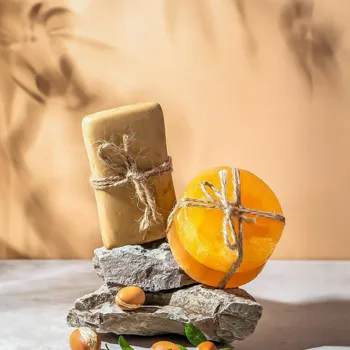
In ancient Egypt, rice bran extract and jasmine were used for their sun-protective properties. In Ayurveda, oils like sesame oil and coconut oil were applied to the skin to create a protective barrier.
While these natural ingredients may not offer the same level of protection as modern sunscreens, they did provide some degree of defense against the sun's harmful rays.
More importantly, ancient cultures understood the importance of avoiding prolonged sun exposure, especially during the hottest hours of the day. They sought shade under trees and buildings, wore protective clothing, and used wide-brimmed hats to shield their faces from the sun.
The lesson here is that sun protection is not just about applying sunscreen; it's about adopting a lifestyle that minimizes sun exposure. This includes seeking shade, wearing protective clothing, and avoiding prolonged sun exposure during peak hours.
While modern sunscreens are undoubtedly effective, incorporating these ancient practices into your routine can provide additional protection and help to maintain healthy, radiant skin.
Remember to choose a broad-spectrum sunscreen with an SPF of at least 30 and apply it liberally and frequently, especially when spending time outdoors. Ancient lessons can teach us lots.
Ancient skincare practices for healthy, radiant skin
So, there you have it – five ancient skincare practices that are still relevant and effective today!
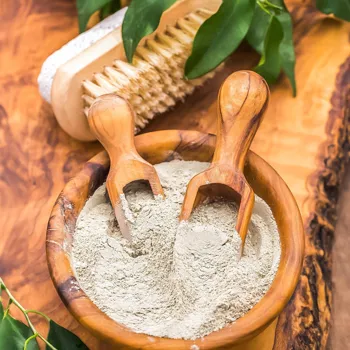
From clay masks to herbal infusions, oil cleansing to fermentation, and natural sun protection to seeking shade, these time-tested traditions offer a wealth of wisdom on how to care for your skin naturally and holistically.
By incorporating these practices into your modern skincare routine, you can tap into the knowledge of our ancestors and unlock the secrets to healthy, radiant skin. Remember, beauty is not just about looking good; it's about taking care of your well-being, both inside and out.
These rituals continue to resonate across generations.
AI Generated Content. Glance/InMobi shall have no liability for the content